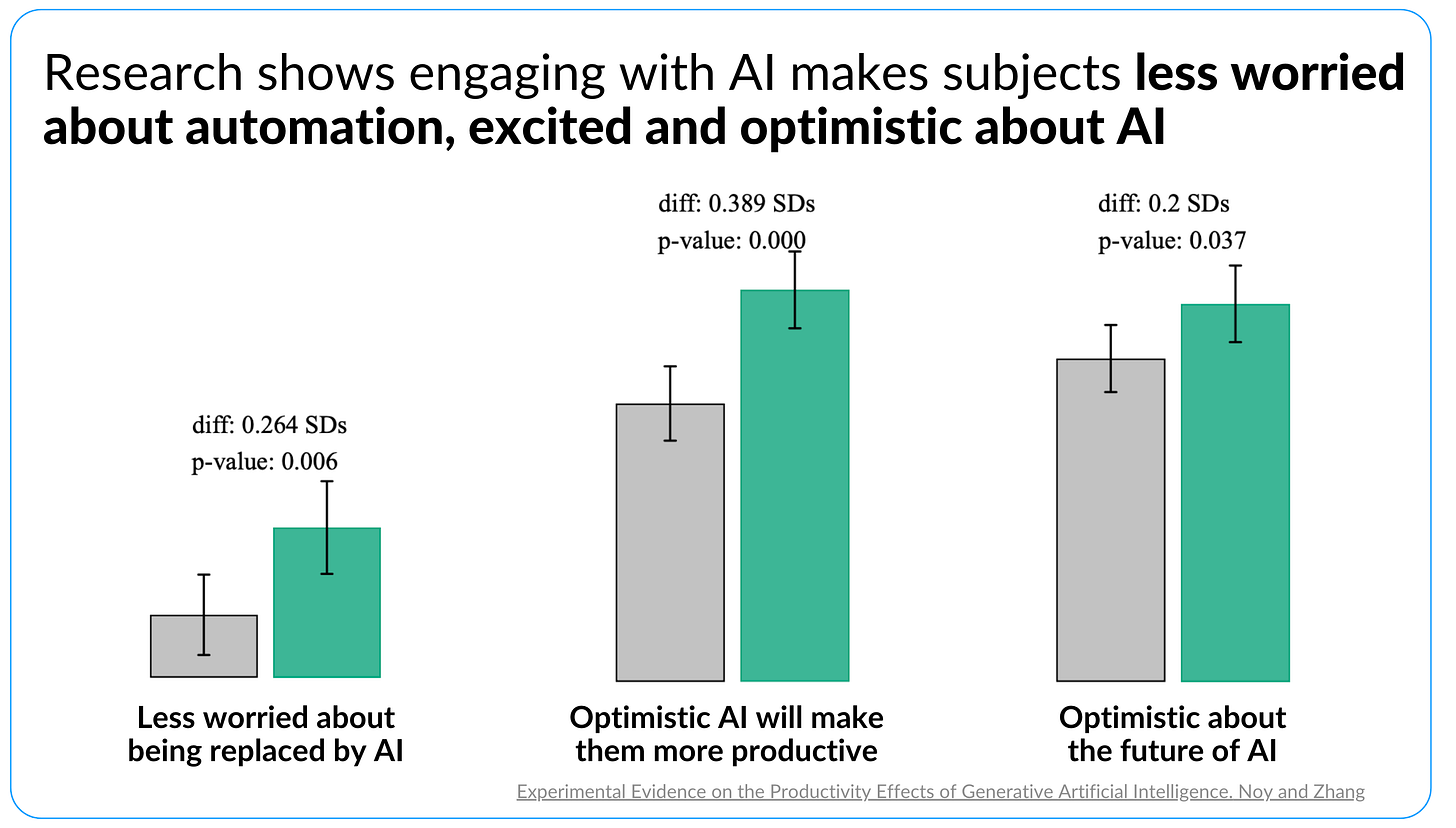New research shows that using GenAI makes us 44% more productive, 20% better, and more optimistic about AI
Using generative AI not only helps make us better, but we also become less fearful of automation and more optimistic about the future of work.
New research from MIT confirms what GenAI proponents already know: it boosts productivity and improves the quality of our work. The study1 challenged 444 college-educated professionals to write press releases, reports, and delicate emails. Half the group used ChatGPT, and the other half didn’t. They were incentivized to receive a top score.
The results reveal good and bad news about the relationship between humans and AI.
GenAI boosts productivity by 44%
ChatGPT boosted productivity by 44%, measured by the earnings made per participant for each minute they worked.
So GenAI makes us more productive — good news!
GenAI improves the quality of our work by 20%
More good news. Participants who used ChatGPT produced 20% higher quality output, as judged by independent graders of the work.
68% were “lazy”
Sadly, 68% submitted ChatGPT’s raw output without modification, which reveals a fundamental misunderstanding of our relationship with AI. While GenAI creates incredibly valuable and often inspiring output, it’s essential to remember that it’s just a good guesser. You must check its work.
Think of AI as a well-informed intern. It’s often wrong, sometimes horribly wrong. For example, while preparing to interview Randy Bean last week, a well-known author for Harvard Business Review and a podcast I host, Data Humanized, I asked Bing a few background questions. AI responded that it was “sad to inform me” that Randy had died in 2021.
Rest assured, Randy is very much alive and was a great guest.
The moral of the story is to use GenAI but check its work.
Trying AI increases optimism about the future of work
More good news! A post-study survey revealed that participants became,
Less worried about being replaced by AI,
More optimistic that AI makes them more productive, and,
More optimistic about the future of work with AI.
If you try AI, you’re more likely to use AI
33% who used ChatGPT during the study reported using it later, compared to 18% from the non-GPT group.
So, if you’re scared or nervous about AI, try it. You might like it!
Join me to learn GenAI and support hospice… at the same time ❤️
Want to try AI in 2024? Not sure where to start?
Join my mini-course, The Generative AI Growth Mindset, to benefit hospice charity this holiday season.
This one-hour presentation is based on a series I teach for Modal Learning, a premier corporate upskilling program on leadership, decision-making, storytelling, and GenAI. Modal has agreed to let me share it to benefit hospice. 100% of the $49 fee, net of the 12% administration fee for the e-learning platform, will be donated to the amazing people who support families dealing with grief and loss at Kaplan House Hospice in Danvers, Massachusetts.2
Join me on December 5th or January 8th to join the GenAI party and help the hospice mission this holiday season at the same time.
Experimental Evidence on the Productivity Effects of Generative Artificial Intelligence, Shakked Noy, and Whitney Zhang
Curious why I chose Kaplan House Hospice? I explain why in this essay When You Suddenly Become Mom and Dad.







I'd be curious what the feeling of those 32% of the people who weren't lazy when using Gen AI?